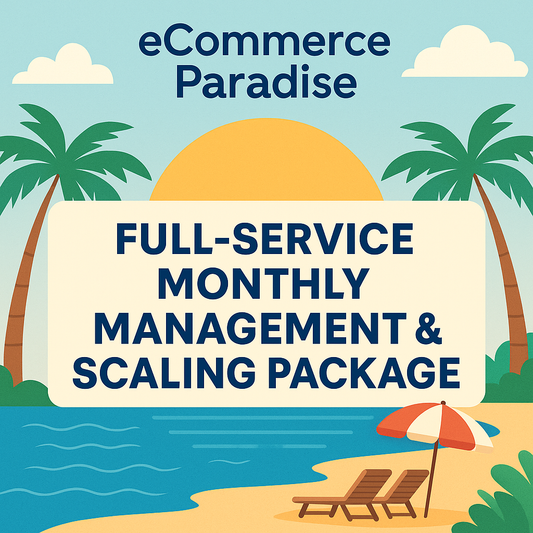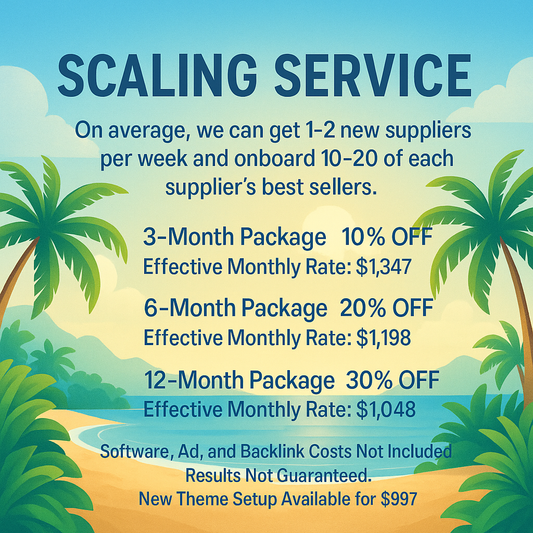
Stay Compliant with Legal Regulations for Dropshipping
Welcome to the world of high-ticket dropshipping! It’s an exciting time to dive into this lucrative business model, but with great opportunities come great responsibilities. One of the most crucial aspects of running a successful high-ticket dropshipping store lies in staying compliant with legal regulations. As an entrepreneur, ensuring that your operations meet legal standards can protect your business and maintain customer trust. In this article, we’ll explore key regulations to keep in mind, how to implement them in your operations, and the value of keeping compliance at the forefront of your dropshipping journey.
Understanding the Importance of Legal Compliance
Legal compliance is more than just a box to check off; it is the backbone of your high-ticket dropshipping store. When you ensure compliance, you create a solid foundation that fosters trust among your customers. Failure to adhere to regulations can result in hefty fines, legal disputes, or even the shutdown of your business. Here are a few reasons to be proactive about compliance:
- Trust & Reputation: Customers are more likely to shop with a business that operates transparently and ethically.
- Risk Mitigation: Understanding the legal landscape minimizes the risk of unexpected challenges that can derail your progress.
- Market Advantage: A compliant high-ticket dropshipping store may have a competitive edge over less scrupulous competitors.
Types of Legal Regulations to Consider
When operating a high ticket dropshipping business, various legal regulations come into play. It's crucial to understand each area to ensure compliance in your operations.
Business Structure and Taxes
Choosing the right business structure is the first step in your compliance journey. Typically, entrepreneurs opt for a sole proprietorship, LLC, or corporation. Each structure comes with its own regulatory obligations, tax implications, and liability protections. Here are a few considerations:
- Sole Proprietorship: Easiest to establish but may expose you to personal liability.
- Limited Liability Company (LLC): Offers liability protection and tax flexibility. This is a popular choice for dropshippers.
- Corporation: More complex to set up and maintain but may be beneficial for those looking to raise capital.
Once your business structure is in place, you’ll need to handle taxes. It's essential to register for an Employer Identification Number (EIN) with the IRS. This number allows you to file taxes and report income legally. Be mindful of sales tax requirements which differ from state to state, especially with high-ticket items.
Consumer Protection Laws
Consumer protection laws exist to safeguard buyers from unfair business practices. When running a high-ticket dropshipping store, it’s imperative that you adhere to these regulations:

- Transparency: Clearly state product descriptions, pictures, and pricing. Avoid misleading information.
- Return Policies: Maintain a straightforward return policy that complies with regulations. Provide customers with clear instructions on how to return products.
- Data Protection: Protect your customer’s personal information. Familiarize yourself with the GDPR and CCPA regulations if you serve international customers.
Shipping and Delivery Regulations
Shipping high-ticket items can present unique challenges, especially when it comes to regulations. Consider the following aspects:
- Delivery Standards: Ensure timely delivery of products to meet customer expectations.
- Shipping Restrictions: Certain products may have shipping restrictions based on local laws. Check these before listing products on your high-ticket dropshipping store.
- Insurance: High-value items benefit from shipping insurance, protecting both you and your customers in case of loss or damage.
Staying Informed on Legal Changes
The legal landscape is ever-evolving, and staying informed is a part of being a successful entrepreneur. To keep your high-ticket dropshipping store compliant, consider these strategies:
- Subscribe to Legal Newsletters: Many law firms and organizations offer newsletters that provide updates on regulations affecting e-commerce businesses.
- Consult Legal Professionals: Having an attorney or compliance consultant can save you time and money, ensuring you navigate the legal environment effectively.
- Join Business Networks: Engaging with other dropshippers can provide insights and share experiences about compliance challenges.
Building a Culture of Compliance
Compliance shouldn’t only be a checklist item; it should be a part of your business’s culture. Here are some steps to help you foster a compliance-focused environment:
- Educate Your Team: Regular training sessions, even if you’re a solo entrepreneur, can help keep compliance at the forefront of your operations.
- Create Guidelines: Draft clear policies related to compliance and make sure they are readily accessible to anyone involved with your business.
- Encourage Open Communication: Foster an environment where questions about compliance can be raised without hesitation.
The Future of Compliance in E-commerce
The landscape of e-commerce and dropshipping is rapidly changing, and this evolution brings new challenges and opportunities for compliance. As more entrepreneurs enter the high-ticket dropshipping space, consumers are becoming more knowledgeable about their rights and regulations. Technology and automation are also reshaping the way we address compliance, paving the way for tools that can help manage compliance efficiently.
So, what’s next? You should remain aware of trends such as:
- Increased Privacy Regulations: With more emphasis on data protection, expect stricter laws to emerge globally.
- More Transparent Supply Chains: Consumers are demanding to know where their products are coming from and how they are manufactured.
- Enhanced Consumer Rights: As e-commerce grows, so does the push for stronger protections for consumers.
Thriving in the High-Ticket Dropshipping Arena
Staying compliant with legal regulations in high-ticket dropshipping may seem complex, but think of it as a framework for your business's success. By prioritizing compliance, you not only protect yourself legally; you build the trust and credibility crucial for long-term success. Your customers are looking for a reliable and ethical shopping experience, and being proactive in adhering to legal standards is a way to stand out in a crowded market.
Whether you’re just starting your high-ticket dropshipping store or looking to refine your processes, there are abundant resources available to keep you informed and compliant. Embrace the journey ahead, focus on providing exceptional service, and consistently work towards being the best version of your dropshipping business. After all, success in the high-ticket dropshipping arena isn’t just about the sales—it’s about building a brand your customers can believe in!


















